We’re delighted to welcome new Master of Education course coordinator, Dr Yvette Slaughter. From research background to influential figures in her career, get to know Dr Slaughter with our quick Q&A.

Q: Do you mind giving a short introduction to your background?
I’ve been fortunate to have had the opportunity to teach in a range of educational contexts in Asia, Europe and in French Polynesia, as well as across educational settings in Australia. As my teaching and academic work has focused on languages and language education, I have been able to experience how language use is as much political and ideological as it is educational. These experiences have shaped by focus on language and identity and how this plays out in the education system.
Q: Do you have a particular area of research/specialisation?
My areas of specialisation are language policy and language education, in particular the use of plurilingual pedagogies. One of the consequences of the monolingual framing of our curriculum and assessment systems is that the linguistic diversity that Australian children possess is silenced or viewed as deficit. Curricula in Australia call on us to draw on students’ lived experiences, and that should include the rich, complex and diverse linguistic and cultural repertoires of our students. It is critical that we continue to empower teachers to create space for practices that support better educational outcomes for both multilingual and monolingual students.
Q: Do you have a defining moment or influential person who encouraged you to get into education?
Many years ago, I took conversation classes with adult migrants. I remember one person in his 80s who told me he had dreamed all his life of bringing his family to Australia so that they could receive an education and have a better life. He was the only member of his family to survive and arrive in Australia and he carried that with him every day, never failing to attend a class. Even now my research involves adults and children who have never had the opportunity to learn to read or write in their first languages. I am always inspired by the desire of others to learn and to help others learn, regardless of their life experiences. I can’t think of a better profession to be in than education.
Q: As it is International Women’s Month, what’s your opinion on the importance of women in the field?
Although we have made huge progressions in education, I am acutely aware that many people of my parents’ generation never had the chance to finish school, particularly women. Twitter is full of first generation hashtags – first generation to finish high school, first generation to go to university, first person in the family to complete a PhD. It’s critical that we continue to support those who identify as female in education, their transition into academia and continue challenging structural inequality so that a broad and diverse range of women have access to education.
Q: What are your passions outside of education?
Although it is related to education, technology. How technology is socially constructed, how it builds on, interferes with and changes our lives. Our children’s experiences of the world have been so profoundly shaped by technology, for better and for worse, and it has resulted in such a deep generational change. I’m excited by the possibilities that these experiences provide our children and what their future look might look like.